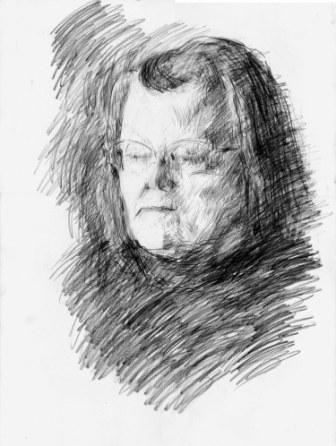The Globe and Mail today had a discussion by Russell Smith about the use of “that” and “which.” Neither my husband (a teacher of English for 34 years) nor I were aware of the distinction, though I think we may have known it subconsciously. “That” is used for a restrictive clause, “which” for a non-restrictive clause. Bill got out Wilson Follett’s Modern American Usage and read me a long discussion of the situation. Follett (following Fowler) says that keeping the difference between the two words means that you are not relying just on commas to make the distinction between non-restrictive (which Smith calls non-essential) and restrictive (essential) clauses. The short story writer Dorothy Canfield Fisher in discussing her method of revising said she goes through a story “cutting out the whiches.” “Which” is an inelegant word, it seems to me, but I don’t know why. You can sometimes convert the which clause to a participial phrase, which seems more elegant, or to some other construction. For example, I could revise the previous sentence to “…a more elegant participial phrase”, cutting out the whiches. I am using elegant and inelegant under the influence of Russell Smith’s column.
When I say Bill and I might have known the distinction subconsciously, I am thinking of when I read aloud to myself what I have written (as I always do before sending it off for publication) and discover that a certain word or phrase doesn’t sound right.
As the old saying goes, you learn something new every day, which only makes you realize how much you don’t know and how little time you have left to know everything.
Thursday, January 04, 2007
Subscribe to:
Post Comments (Atom)

5 comments:
"Strictly speaking," Russell Smith should know better than to propagate foolish lies about English. And if he doesn't know they're lies, he should do some research before publishing nonsense. For the facts, see for example the post by Geoffrey Pullum, co-author of the Cambridge Grammar of the English Language, about "which hunting."
http://itre.cis.upenn.edu/~myl/languagelog/archives/000918.html
or this one by another linguist
http://itre.cis.upenn.edu/~myl/languagelog/archives/002189.html
One of my favourite lessons (WHICH I drag out over all my lessons) is about how English does not have a central authority. Unlike, French and Italian that have their 'academys' to satisfy their purist intents. THAT way of teaching helps students eventually understand phrasal verbs, neologisms and nonsense words - leading them to a type of poetic licence to communicate their sentiments as effectively as possible. I see many English as a second or foreign language instructors teach by intuition. They are teaching not by virtue of vocation, but because they are mother-tongue users of the language. Their students often come to me confused. I can explain the 'correct' grammar to them when required. But I prefer the attitude of the Oxford University Press grammar books. Being that there is no 'correct' English - at best only a 'standard' English. Teaching hard and fast rules of grammar early on, makes it difficult for students to accept colloquialisms, spelling and pronunciation variants, and similar. Such as those who will teach that the article 'an' is used in front of vowels, and later must explain away 'a university.' Instead - whether right or wrong - I teach 'THAT' when it refers to a unique thing; and 'WHICH' when it is one from a selection or group. This is not purely 'correct' - but satisfies the majority of instances when we find those words in the vernacular.
Thanks Brett for those urls. I have printed out the contents of the first one.
Dr Satori, I agree. I teach English next door in Greece. Since my students are basically only interested in the Proficiency exams, I tell them to use "which" if there's a comma and it's a defining relative clause, and after prepositions, and the rest of the time to use whatever they want. They have a hard enough time learning vocabulary and basic grammar. Such questions of style are a waste of time for them.
I don't claim to be a master of prose style, but I daresay I don't have a tin ear, and I've never been able to understand what all the fuss is about. I find absolutely nothing objectionable with "which". I get the feeling that someone once said that one was better than the other, and people have been repeating it without knowing why.
In my novel writing, however, I avoid using either one as much as I can.
Hey thanks for bringing up the question. As a French speaker - English is not my mother tongue - I always try to figure out whether I should use WHICH or THAT, what sounds better to my ears. I think I've learned along the way that one should always use "which" after a comma, and generally speaking "that" kind of sounds more coloquial than "which". Well, I guess. When I'm writing I just try to feel which one comes up more naturally.
By the way thanks for your last comment in my blog.
Post a Comment